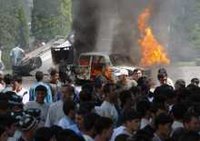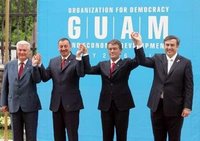 Last week, International Crisis Group issued a new policy brief on developments in Uzbekistan - "Uzbekistan in for the Long Haul." In it, ICG gives a dark picture of future developments in the country, after the May 2005 Andijon massacre. As western relations with Tashkent have been frozen ever since, ICG advocates long-term measures to deal with the Karimov regime, partly based on a regional perspective. As for US-Uzbeki relations, one may, however, question whether ICG's analysis may be wholly correct.
Last week, International Crisis Group issued a new policy brief on developments in Uzbekistan - "Uzbekistan in for the Long Haul." In it, ICG gives a dark picture of future developments in the country, after the May 2005 Andijon massacre. As western relations with Tashkent have been frozen ever since, ICG advocates long-term measures to deal with the Karimov regime, partly based on a regional perspective. As for US-Uzbeki relations, one may, however, question whether ICG's analysis may be wholly correct.In its analysis, ICG claims that "Uzbekistan is well down the path of self-destruction," where the "elite prospers while the majority lives in worsening poverty." The country is marred by political repression and economic misrule, and president Karimov has stopped any further attempts at political and economic reform. "Religious and political repression and worsening living standards have raised domestic tensions and provoked violence," ICG reports.
Uzbekistan is also depicted as a regional threat. Primarily, the country is a source of trafficking in drugs and people, and thereby complicates regional measures to deal with these problems, in relation to Afghanistan and the region as a whole. Furthermore, the threat of violence that Karimov poses to his own citizens may spark a refugee crisis if political and religious repression would peak and things would come to the worst. That Tashkent consistently tries to spoil any attempts at regional cooperation only adds to the picture of Uzbekistan as a potential threat to Central Asia. Already at this point, Karimov-imposed border closures and trade restrictions on neighbour countries, significantly hampers regional development. Furthermore, Uzbekistan has thus far been negative to cooperate with its neighbours on common concerns and resources, such as water, energy, and infrastructure. All in all, ICG claims that "Uzbekistan could well become the centre of instability in Central Asia in the medium to long term."
Despite this dark picture one may only agree with ICG that the "government in Tashkent is not at risk of imminent collapse." However, on the regional level one should perhaps pause to ponder whether ICG is completely right in its concerns and predictions. It is true that western policies towards Uzbekstan have failed. Support to develop "political and economic openness" was simply not in the interest of Karimov's regime. The question is whether this was in the interest of the US. It is quite obvious that western sanction policy imposed after the Andijon massacre remains a resounding failure. Thus, ICG reports that "relations with Europe and the US are the worst since independence in 1991." As far as this may be correct regarding Europe, one should perhaps be cautious to draw the same conclusion as for the US, as indicated above. The main question is whether the prospects of a volatile process of democratisation in Uzbekistan is in the interest of US policy in Central Asia.
By now, it would appear a well-established fact that democracies are stable but democratisation is shaky. Therefore, one might, contrary to ICG's argument, assume that the US is quite happy with the current situation. The Andijon massacre gave the US a convenient excuse to get the issue of democratisation off the agenda, thus avoiding further confrontation with Karimov. The situation allows the US and Uzbekistan respectively to go about their own business without the fear of interference by the other. On the official level, relations may well be frozen, but this this also leaves room for informal cooperation and tacit agreement on matters of mutual importance. One may also question whether it really is so important for the US to have "influence with the Karimov government" as long as conditions for US policy in Central Asia remain stable. Given this, who rules Uzbekistan is of little interest to the US. That the US implicitly has chosen to acquiesce with the situation is probably because further confrontation might have posed a threat of instability to the US position in Central Asia. For Washington, it is better to leave things as they are rather than rocking the boat.
Such an argument would also challenge ICG's assumption that Uzbeki instability could "prompt an aggressive Russian intervention in the region." Firstly, Russia has - for long - abandoned the alternative of armed intervention in post-soviet space, while Moscow has realised that it has much more effective - mainly economic - means at its disposal. Secondly, Moscow and Washington see eye to eye on the importance of stability in Central Asia. This shared realist view, is likely to make the US and Russia act in concert to avoid instability in the region.
Then, one should rather consider ICG's assumption that political and religious repression could "stimulate the undercurrents of Islamic extremism that so far have been more of an irritant than a major threat." That would be more in line with an argument linked to the dangers of future socio-economic collapse in Uzbekistan spiralling into increasing and small-scale conflict and confrontation rather than outright revolution. Such developments might well strengthen extremist movements in Central Asian societies. Extremism is born by extremities - something people turn to out of despair and desperation. It is from this perspective, that one is likely to agree with ICG that "Uzbekistan could well become the centre of instability in Central Asia in the medium to long term."
As for ICG's policy conlusions, one cannot - as a soft European caffe latte liberal - but agree on them. This "lifeboat strategy to maintain political activity, civil society and educational opportunities in the expectation of future change" may perhaps not be the most effective way to support change in Uzbekistan, but it is the means at our disposal. Long-term measures within education, good governance, civil society etc, combined with socio-economic support as well as assistance to neighbouring countries to solve outstanding problems with Uzbekistan, is what one can reasonably do. On this nomative level, one is likely to agree with ICG. The thousand dollar question is, however, whether conclusions would be different if taking a different - more realist - view on stability into account.





















